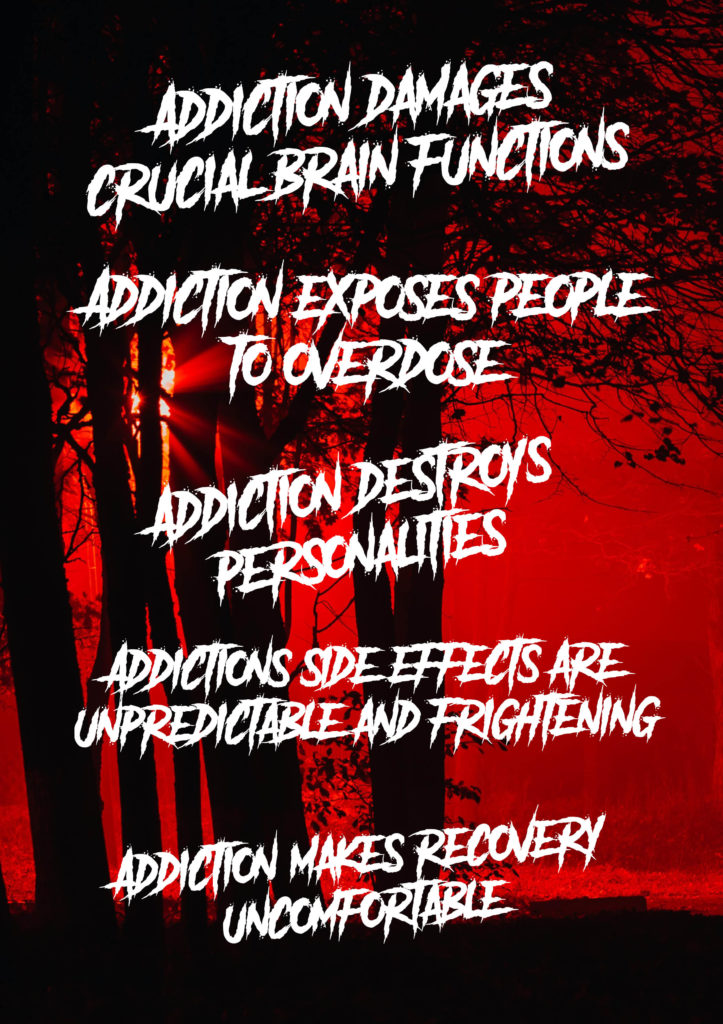The 5 most horrifying things drug and alcohol use does to people
October is dubbed by many Americans as “spooky season.” Capped by the celebration of Halloween, it’s a time when many people go out looking for a fright from ghosts, goblins, witches, zombies and other scary things.
For some people, however, their life with drug or alcohol addiction is much more frightening, and they live it every day. Their families live in fear of a phone call in the middle of the night that they’ve been arrested, or worse, suffered an overdose. People struggling with substance use disorders (SUDs) also have to deal with scary side effects that could worsen over time.
Related: The Effects of Opioids on Your Body
Not to mention, the emergence of fentanyl in drug supplies has made drugs a trick bag for millions who’ve lost their lives to fatal opioid overdoses. We’re looking to reverse the trends at Landmark Recovery. As difficult as it is to prevent an addiction from developing, countless research and recovery stories show that with continued care and treatment, most people overcome their addiction, restore their minds and bodies and go on to live healthier lives.
Call 888-448-0302 for more information on addiction treatment and recovery resources.
To help detail the scariest parts of addiction, here are the five most horrifying things drug and alcohol use does to people.
1. Addiction damages crucial brain functions
Repeated drug or alcohol use can damage the brain over time, interfering with the way the rest of the body functions. If a person regularly drinks much more than the recommended limit of alcohol, for example, they could experience damage to brain cells that affect their memory. Plus, their ability to think clearly could worsen over time. This is a condition known as alcohol-related brain damage (ARBD) or traumatic brain injury (TBI).
Repeated use of stimulant drugs like cocaine or methamphetamine can also damage the protective lining of the brain known as the blood-brain barrier (BBB). The BBB protects toxins from entering the brain from the blood supply. However, many brain conditions are reversible when caught early during recovery.

2. Addiction exposes people to overdose
You can’t become addicted to drugs or alcohol after a single use. However, fentanyl has made recreational drug use just as dangerous as living with a drug addiction. With drug dealers cutting their drug supplies with this cheap, but powerful synthetic opioid, people struggling with addiction and casual drug users both face a greater risk of overdose. It only takes two milligrams of the synthetic opioid, equal to 10-to-15 grains of table salt, to cause a fatal drug overdose.
The emergence of fentanyl in illegal drug supplies has worsened the deadly trend of drug overdose deaths in the United States and sent shockwaves through communities. Just last year, more than 107,000 Americans died from drug overdoses, with 70% related to opioids like fentanyl and oxycodone.
@landmarkrecovery NARCAN SAVES LIVES!!! #narcansaves #narcanawareness #endoverdoes #overdoeseawareness #howtosavealife #landmarkrecovery #recoverytiktoks #narcansavedmylife ♬ Lo-fi hip hop – NAO-K
3. Addiction destroys personalities
Addiction not only does damage to a person’s health, but it can also change their behavior in ways that impact the world around them. Addiction is a disease characterized by strong desires to drink or take drugs despite experiencing negative consequences. Repeated substance use causes significant changes in the brain, which affect a person’s self-control and ability to resist drugs or alcohol.
People with SUDs are known to obsess over drugs and alcohol. That’s because most have developed a chemical dependence and need substances to make themselves feel normal. As a result, they become different people at times, manipulating the people around them, from loved ones to doctors, in order to support their habits. When people struggle with the effects of addiction, they’re known to pass on activities they once enjoyed, lie to loved ones and doctors, experience frequent mood swings and engage in criminal activity like stealing – all in favor of getting more drugs or alcohol.
4. Addiction’s side effects are unpredictable and frightening
When people develop addictions, the side effects vary. Depending on which substance they take, as well as how much and how often they use, they might experience a wide range of symptoms that can be scary to manage. For example, people who struggle to control their drinking have trouble staying conscious, controlling their heart rate and maintaining balance and coordination. This increases the risk of actions that can have dangerous consequences, such as falling asleep while driving.
On the other hand, we’ve seen an increase in the use of addictive, novel drugs like xylazine across the United States. These drugs have sedative effects that slow brain activity and limit life-saving functions such as heart rate and breathing. However, when combined with alcohol or other illegal drugs like heroin, repeated use of sedatives can lead to shallow breathing or extreme drowsiness lasting up to one hour. If a person’s breathing becomes too weak, they could lose consciousness or die.

5. Addiction makes recovery uncomfortable
When people develop addictions, their bodies no longer function properly without drugs or alcohol. Over time, repeated substance use leads to chemical dependence that is difficult to overcome without professional help. No different than cancer or diabetes, addiction is a chronic illness that, if left untreated, can last a lifetime and increase the risk of death.
When people attempt to limit their substance use or quit altogether, those with chemical dependence might experience intense cravings to continue drinking or taking drugs. Some people might also become incredibly sick, and as a result, keep using substances to make their symptoms go away. Addiction is known as a relapsing disorder, meaning it’s normal for people to return to drugs or alcohol even after going to inpatient rehab or 12-step meetings.
Don’t be tricked by negative stereotypes, treat addiction symptoms
Addiction is often mischaracterized as a moral failing or choice. The truth is, it’s almost impossible to point to one factor that leads to repeated substance use and addiction. That’s why it’s important to understand how the disease works before painting more than 40 million Americans battling substance use disorder with a broad brush of negative stereotypes.
It’s difficult and sometimes painful, but not impossible to reverse the effects of addiction. If you or a loved one is struggling to control your drinking or drug use, we’ll help you overcome it at Landmark Recovery. Call 888-448-0302 for 24/7 access to one of our recovery specialists.
Visit our locations page to find a treatment center near you.

Choose Recovery Over Addiction
We're here 24/7 to help you get the care you need to live life on your terms, without drugs or alcohol. Talk to our recovery specialists today and learn about our integrated treatment programs.




